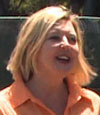| |
|
|

|
|
ATLAS |
|
|
Assistive
Technology
Laboratory
at
Stanford |
|
|
|
Technology
and design benefitting individuals with disabilities and older adults in the
local community |
February 17, 2016 |
|
|
|
|

Perspectives is the newsletter of the
Stanford course,
Perspectives in Assistive
Technology.
This issue invites you
to attend Thursday's field trip.
Perspectives in Assistive Technology is a Winter
Quarter Stanford course - now in its tenth year - that explores the design,
development, and use of assistive technology that benefits people with
disabilities and older adults. The schedule
consists of semi-weekly classroom discussions; lectures by
notable professionals, clinicians, and assistive technology users; tours
of local medical, clinical, and engineering facilities; an assistive
technology faire; and a film screening.
Next class
session - Thursday, February 18th at 4:45pm
at the Magical Bridge Playground (maps
& directions from Stanford):
|

|
Field Trip to the Magical
Bridge Playground
Olenka
Villarreal
Founder of the Magical
Bridge Playground
|
|
Abstract: Of the
34 existing public parks in Palo Alto today, not one has been built with
everyone’s unique physical and cognitive needs in mind. Most of the
playground designs are similar and do not reflect the many different types of
people living in the community - those with autism, visual and hearing
impairments, cognitive challenges, and even older adults. The urgent need to
create a playground that would surpass ADA standards was the drive behind the
vision for a new kind of playground - one designed for everyone. The $4 million
needed to create such a place was raised privately in less than two years.
Created by a team of inclusion experts and located in Palo Alto’s Mitchell
Park, the Magical Bridge Playground
broke ground in June 2014. Now that it is completed, it is the nation's most
innovative inclusive playground. |
|
Biosketch: With
an undergraduate degree from Pomona College and MBA from Golden Gate
University, Olenka Villarreal spent 18 years working with start-up and
technology companies in Silicon Valley. When her second daughter was born with
disabilities in 2003, she turned her focus on improving the quality of life of
those with disabilities. Olenka serves on the Board of Directors for the Palo
Alto Unified School District's
Community
Advisory Committee for Special Education, on
Life Services Alternatives in San Jose,
and is Vice President of Friends of
the Palo Alto Parks. In June 2014, Olenka was presented with the
prestigious Jefferson Service Award in recognition of her efforts to make the
Magical Bridge Playground a reality. |
|
Suggest a project -
Good assistive technology project suggestions are sought for Stanford's
Mechanical Engineering capstone course (ME113) for the upcoming Spring Quarter.
Your suggestions should be based on an observation or experience of a real
challenge faced by individuals with a disability or older adults.
Projects will involve the design and fabrication of a
functional solution to the problem, as well as student team presentations and
reports.
This is a great opportunity for individuals,
organizations, or companies to interact with teams of talented, enthusiastic
seniors, benefit from their fresh perspective, and gain access to university
expertise and resources. Students benefit by having the opportunity to apply
their studies of solid and fluid mechanics, manufacturing, and mechanical
design to a real world problem.
Your first step is to visit the
Project Solicitation webpage for a list
of project requirements and a description of how best to convey your ideas. If
your suggestion is accepted, you will have the opportunity to offer the student
team advice, direction, and expertise in person or by phone and/or
email. |
 |
|
|
Attend a lecture -
Course lectures will be held on Tuesdays
and Thursdays from 4:30 to 5:50pm and are open
to the greater Stanford community. You are most welcome to sit in on class
sessions that interest you. You need not be a Stanford student and there is no
required signup, enrollment, or charge. The class will meet in a large, tiered,
accessible classroom on campus in the Thornton Center, adjacent to the Terman
Fountain and near the Roble Gym, the same venue as last year. Here are the
parking options, maps, and directions to
the classroom. |
 |
|
|
Did you miss a
lecture? - Course lectures are posted on YouTube. To find the links,
browse to the Lecture Schedule webpage,
scroll down and click on the lecture of interest. Near the bottom of the page
you will see the Lecture Material section which has links to the slides,
photos, weblinks, and lecture video. |
 |
|
Would you like to support the
course? - Funding in any amount for the course and student projects
is always welcomed. Monetary gifts support approved project expenses,
administrative costs, honoraria for guest lecturers, and the end-of-term
celebration. Refer to the Team Project Support
webpage for more information.
Do you have a question,
comment, or suggestion? - If you have general questions, comments,
or suggestions about the course, David L. Jaffe, MS, the instructor, can
be reached by email or at
650/892-4464. Thank you again for your interest in the course.
Dave
|

To unsubscribe from this newsletter, please email
Dave. |
|







